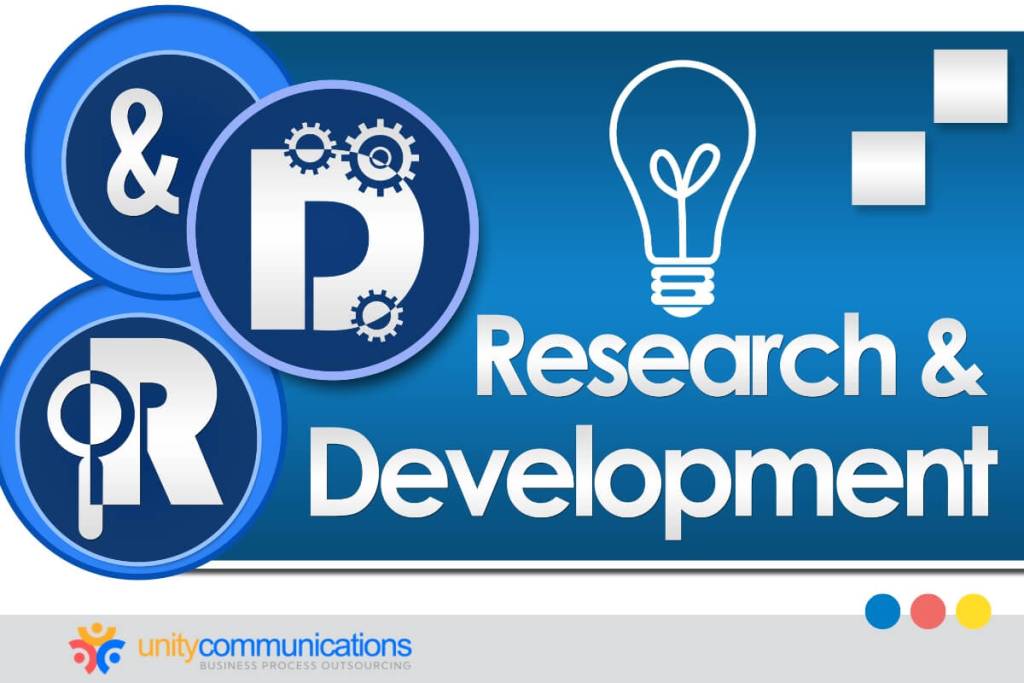IN THIS ARTICLE
Table of Contents
In any industry, long-term growth hinges on research and development (R&D). Enterprises across all sizes depend on unique concepts, services, and products to compete, and the precision of the R&D process is imperative.
Consequently, many decision-makers are exploring options beyond their in-house R&D capabilities. Business process outsourcing (BPO) presents its pros and cons, but it consistently emerges as a strategic decision for exploring and crafting new materials, products, and solutions for expansion.
This article discusses the role of BPO in research and development functions. It talks about the advantages of outsourcing and its market trends.
BPO services for research and development

Engaging in R&D enables a company to maintain a competitive edge. Without sufficient R&D initiatives, a company might struggle to thrive independently and resort to alternative methods such as mergers and acquisitions (M&A) or partnerships to foster innovation. R&D empowers companies to create novel products and enhance their existing offerings.
In 2022, around 87% of the top 100 companies increased their R&D spending. The main goal was to develop cutting-edge technologies for their respective sectors.
BPO services in this context involve delegating specific research and development functions to external service providers. While BPO is more commonly associated with customer service, it is increasingly applied to certain aspects of R&D as it allows companies to leverage specialized skills, reduce costs, and enhance efficiency.
So, what is BPO’s role in research and development? Companies often outsource various R&D activities to third-party partners, such as:
- Literature review and documentation. BPO providers can assist in conducting literature reviews to comprehensively understand existing research in a specific field. This process involves documenting research findings and creating comprehensive reports.
- Product design and development. This procedure involves outsourcing the conceptualization, design, and development of new products. It includes prototyping and testing product concepts.
- Market research. This business function involves conducting market surveys and analysis to gather insights on industry trends and consumer behavior. It can also include competitor analysis and benchmarking.
- Innovation. This service involves outsourcing research on emerging technologies and trends relevant to the industry and developing innovative solutions and technologies. It also entails collaborating in brainstorming sessions and idea-generation processes.
- Technology research. BPO companies can help research emerging technologies and trends relevant to a particular industry, keeping abreast of technological advancements that could impact the business.
- Clinical research. Companies may contract clinical research organizations (CROs) for pharmaceutical and biotech research. Third-party CROs conduct clinical trials and perform data management, entry, validation, and quality assurance of clinical trial data.
- Testing and quality assurance. BPO providers can assist in software testing, hardware testing, and quality assurance processes. They also help perform validation and verification tests for product development.
- Prototype development. Rapid prototyping services for iterative development involve building and testing prototypes for new products or technologies. Prototype tests include usability testing and performance testing.
- Material research and development. This business process pertains to researching and developing new materials for use in product or manufacturing processes. It also involves testing and validating material properties.
- Environmental impact studies. This outsourcing service involves studies on the environmental impact of products or processes, sustainable development, and green technologies.
- Intellectual property (IP) research. Outsourced IP research involves conducting IP searches and analysis to ensure freedom to operate and identify potential infringements. It entails filing patents and managing the documentation and administration of patents and other intellectual assets.
- Feasibility studies. BPO providers specializing in research and development can help assess the feasibility of new projects or initiatives. It includes economic, technical, and operational feasibility studies.
- User experience (UX) research. Conducting user research and usability testing for product design improves user interfaces and overall UX. It involves gathering user feedback and making recommendations for improvements. The goal is to assess the user-friendliness of products or applications.
- Prototype manufacturing. This outsourced process involves manufacturing prototypes for physical products, iterative testing, and refinement.
Advantages of outsourcing research and development activities

Many companies leverage outsourced R&D for its positive impact, and the industry will only grow bigger. The market for outsourcing R&D services is projected to experience a compound annual growth rate (CAGR) of 8.11% from 2023 to 2028. During this period, the market size is anticipated to expand by $3.89 billion.
The advantages of BPO-led research and development vary depending on industry, scale, and other factors. In many instances, third-party R&D offers financial, competitive, and qualitative benefits compared to in-house R&D, such as:
- Enhanced bandwidth. Internal R&D operations can be costly, especially when they strain existing proprietary operations. Initiating a new research project may overwhelm personnel and facilities, leading to subpar work, incomplete testing, and an increased need for rework.
- Financial efficiency. Expanding facilities, leasing additional laboratory space, and hiring new staff can be expensive and often unnecessary. Continuous expansion can result in inflated and fixed expenses that surpass operational needs after the desired product is developed.
- Specialized expertise. While manufacturers possess significant institutional knowledge, they may lack experience working with new ingredients or formulations. Outsourcing R&D enables manufacturers to quickly access up-to-date information and expertise, utilizing these resources to educate internal teams.
- Accelerated speed. Outsourcing R&D facilitates a faster time-to-market for companies and often requires a lower financial investment. The overall result is increased speed in bringing a viable product to market.
- Improved value creation. Contracts for R&D outsourcing can be structured with time limitations. This approach is effective for research projects with undefined delivery items, making cost predictions easier and allowing for accurate cost-benefit analyses. Some projects may not proceed due to unfavorable cost considerations.
- Established connections. Outsourcing R&D involves initiating a mutually beneficial business relationship that aids in making industry connections and enhancing brand recognition. The outsourcing partnership can serve as a foundation for ongoing collaboration, advice-seeking, and resource pooling.
- Thorough risk management. Not all products progress beyond the design phase, and success in the marketplace is not guaranteed. Outsourcing R&D helps mitigate financial risk by avoiding significant investments in technology and internal staffing that may not yield returns.
Tools BPO companies use to manage research and development activities

BPO organizations involved in outsourced research and development activities leverage various technologies to enhance efficiency, collaboration, and innovation. When strategically integrated, these technologies enable BPO companies to deliver high-quality R&D services, meet project requirements, and stay competitive in the ever-evolving landscape.
Here are some commonly used technologies in outsourced R&D activities:
- Data analytics tools. Data visualization and analytics tools help BPO companies analyze research data, identify trends, and derive actionable insights.
- Computer-aided design (CAD) software. For BPO companies involved in product design and development, CAD tools are essential, allowing for 2D and 3D modeling.
- Innovation management software. Platforms, such as IdeaScale and Brightidea, support the management of innovative ideas and facilitate collaboration and idea generation within the outsourcing company.
- Virtual reality and augmented reality (VR/AR). BPO companies engaged in product development may use VR and AR technologies for virtual prototyping, design validation, and simulation.
- Artificial intelligence and machine learning (AI/ML). BPO companies may integrate AI and ML algorithms for data analysis, pattern recognition, and predictive modeling in R&D projects.
- Version control systems. These systems are crucial for managing version control in software development and collaborative R&D projects.
- Simulations and modeling software. Tools such as COMSOL Multiphysics and Ansys are used for simulations and modeling in various fields such as engineering, physics, and materials science.
- Biotechnology tools. BPO companies specializing in biotech R&D may use software tools, such as bioinformatics software and genome sequencing tools, for genetic analysis and sequencing.
- Robotic process automation (RPA). RPA technologies can automate repetitive tasks, improving data processing and analysis efficiency.
- Augmented data management. These tools assist in managing and integrating diverse data sources, ensuring data quality and consistency in R&D projects.
- Customer relationship management (CRM) systems. CRM systems help manage client relationships, track interactions, and maintain project-related information.
- 3D printing technology. BPO companies involved in product development may utilize 3D printing for rapid prototyping and testing.
The bottom line
Outsourcing R&D offers a strategic approach to managing costs, leveraging expertise, accelerating development, creating value, building connections, and mitigating risks, making it a favorable option for many companies across diverse industries.
While BPO on research and development offers numerous benefits, companies must carefully select and manage their outsourcing partners, establish clear communication channels, and proactively address potential challenges.
Unity Communication is one of the top BPO companies in the Philippines. Let’s connect to find out how we can boost your research and development functions!





